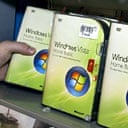Microsoft today caved in to the European commission and agreed to comply with a landmark anti-trust ruling more than three years after it began a rearguard action against the decision and a record €497m (£347m) fine.
In a move hailed by Neelie Kroes, EU competition commissioner, as opening up the global IT market to greater consumer choice, the world's biggest software company accepted swingeing price cuts for interoperability information that would enable rival servers to work smoothly with its Windows operating system.
The company, which has been fined a total of €777.5m plus interest in the past three years, also tried to bury the hatchet with the EU's competition regulator by saying it would not appeal against last month's decision by the court of first instance, to strike down its appeal against the March 2004 commission ruling on its abuse of dominance.
Microsoft now hopes that Ms Kroes will not levy further fines for its failure to comply with the 2004 ruling from December 2005 until today. Last week it said in an SEC filing in New York that it was potentially liable to penalties of $1.6bn up to the end of June alone.
Drawing a line under the EU's most high-profile anti-trust case, Ms Kroes said: "I sincerely hope we can close this dark chapter in our relationship and go on in an absolutely close and constructive way ... I feel a bit sad as it took so long, so many years when the consumer suffered because Microsoft didn't go along with what the commission asked it to do."
But she made plain she had not yet decided to waive further fines for past non-compliance and would continue to examine other pending cases, the most outstanding of which is being brought by ECIS, a lobby representing Microsoft's biggest opponents such as IBM, Red Hat and Sun, over its new Vista operating system. "This shop is still open," she said.
Most legal observers believe, however, that the nine-year battle since 1998 between the EU and Microsoft is virtually over. Alec Burnside of Linklaters said: "It has the flavour of everyone downing their weapons and looking to the future rather than continuing to fight old battles."
The deal that Ms Kroes refused to call a settlement began with a dinner for Steve Ballmer, Microsoft's chief executive, in a restaurant near her home in The Hague straight after the CFI judgment. Negotiations that continued almost daily ended today. Under the deal Microsoft has agreed that open source software developers for the rival Linux operating system, seen by the EU as its sole rival in a market it dominates by 80%, will be able to access and use the "complete and accurate" interoperability information.
In a remarkable climb-down it has accepted a one-off fee of only €10,000 in royalties for this information and a slashing of its original demand for 5.95% of product revenues for a worldwide patented licence to a mere 0.4%. This is seen by lawyers as in effect price-fixing for intellectual property rights (IPRs) and their downgrading before consumer rights.
Agreements that Microsoft strikes with rival developers will be enforceable in London's high court, seen as the premier European court for handling high-profile IPR and international contract cases.
The commission, meanwhile, extended its deadline for its inquiry into Google's $1.5bn purchase of internet advertising broker DoubleClick from October 26 to November 13. Julia Holtz, Google's competition counsel in Europe, said her company had told the EU it would keep certain DoubleClick business practices "unchanged" while Andrew Cecil, head of public policy at Yahoo! Europe, an opponent of the merger, insisted the deal would strengthen Google's dominance.
